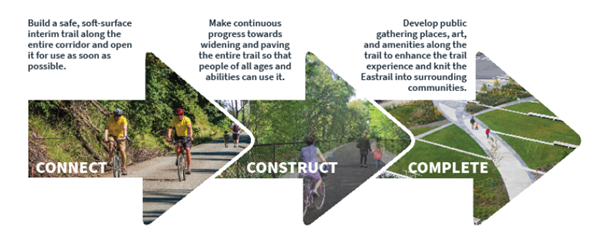Eastrail Partners’ 2023-2026 Strategic Plan
Eastrail Partners unifies and catalyzes the Eastrail effort to make the 42-mile Eastrail for everyone,
every day. Collectively we are making great strides in realizing the vision for a fully connected,
multifaceted public space that is more than just a trail. Now is the time to build on that momentum
and realize the full vision for the Eastrail.
Where We Started
Eastrail Partners was founded in 2019 to accelerate development and maximize the value of the 42-
mile Eastrail, a significant rail-to-trail project running along the east side of Lake Washington from
Renton to Snohomish.
The Eastrail is generational opportunity that fosters community, equity, and sustainability for our
region. Eastrail improves access to transit options and to greenspace, decreasing carbon emissions for
our region; produces positive health outcomes for all populations; boosts economic growth through
connections to employment hubs; and connects the diverse communities of the corridor. Eastrail is
major spine of our regional trail network, linking to over 175 miles of existing trails.
This exceptional opportunity requires exceptional community, governmental, and business
partnerships to connect and construct all sections of the trail, and Eastrail Partners has catalyzed
progress by engaging and collaborating with these stakeholders.
In our first three years as an organization, Eastrail Partners hired two full-time staff members; led
partnerships and advocacy resulting in more than $43M total funding to the Eastrail effort, including
securing $9.5M in private sector trail investment; and successfully acquired federal 501c3 nonprofit
status.
The Next Three Years
Now is the time to build on this momentum and realize the full vision for the Eastrail. To achieve this,
Eastrail Partners needs to transition from a start-up stage as an organization to further deliver on our
mission and growing towards our vision for Eastrail.
Vision
Making the Eastrail for everyone, every day
An Eastrail for everyone means a welcoming, inclusive, and accessible trail for anyone wanting to
walk, roll, or stroll. Everyone should see themselves and their communities represented in this effort.
“Every day” reflects a trail that is more than a trail: a flourishing public space that is a part of daily life
connecting to transit options, nature, and communities – neighborhoods, public spaces, jobs, shops,
and more.
Mission
To create a thriving trail that reflects the diversity of the Puget Sound in partnership with
communities, business, and governments to raise awareness, secure trail funding, and connect people
to each other and the trail.
As the only entity solely focused on the Eastrail, Eastrail Partners’ mission demonstrates how our
organization is uniquely positioned to unify and catalyze this effort. Bringing community, business,
and governmental partners together is how we create a multifaceted and equitable trail.
Four Strategic Areas of Focus
The Eastrail Partners board of directors has identified four areas of focus for our work over the next
three years to ensure we continue to lead towards a fully connected Eastrail:

These strategic goals also reinforce the foundational framework approach approved by our
governmental and corridor partners:

| Goals | Description | Outcomes |
| Advance Trail Funding for Eastrail in King County a. Build ongoing relationships with lawmakers, community members, and private sector for trail investment and advocacy. b. Partner with trail owners, RAC, and staff to drive funding strategies, secure governmental trail funding, and grant and levy opportunities. | Implement a transparent funding and advocacy plan to complete remaining trail gaps for a connected Eastrail through King County. | Cohesive trail funding plan for all outstanding Eastrail projects in King County. This includes: ● I-90 Steel Bridge and trail Woodinville Design and cost estimates for trail construction ● Acquisition of corridor into Gene Coulon and planning process for trail construction Trail funding plan implemented to allow support to pivot to Snohomish County project when ready. |
| Build Community Support & Engagement and Inspire Community Oriented Design a. Authentically involve the community in creating inclusive events and programs. b. Increase community opportunities to engage in Eastrail planning and use, including trail management and safety. c. Inspire and lead city government and incentivize private developers to create dynamic public spaces along the trail. | Increase community awareness and engagement in Eastrail through community-driven infrastructure and programming. | Trail users are invested in, are proud of, and feel part of the trail. ● Diverse and historically uninvited communities are represented on trail, in programming, and in adjacent development ● Increased trail usage (both active use and place-making) ● Eastrail-Oriented Development program piloted ● Trail ambassadors project piloted ● Engagement and Advocacy with Snohomish County underway |
| Expand and Implement Fundraising Plan for Eastrail Partners a. Structure and implement a fundraising program for Eastrail Partners to diversify and increase revenue sources, including: Corporate support, Individual donors, Major donors, Grant opportunities. Multiyear RAC funding Future Project Management Contracts b. Implement marketing for these priorities. c. Create organizational funding opportunities through events and investment in space activation. | Ensure Eastrail Partners as an organization has diverse revenue sources for sustainable, long-term funding. | Eastrail Partners has acquired new revenue sources, and grown existing revenue areas, for sustainable, longer-term funding. Resulting in: one-to-two years of operating reserves. |
| Implement a Holistic Communications Plan for Eastrail Partners and the Trail a. Build shared communications plan for trail to raise awareness and drive visitorship in partnership with the RAC b. Implement Strategic Communications plan that emphasizes Eastrail Partners’ role as voice of the trail. | Continue to raise awareness, understanding, and support of the Eastrail and its potential for Puget Sound communities, and EP’s role in unifying and catalyzing the trail effort. | Increased understanding of how Eastrail: Improves health/wellness, Creates transportation options, thus decreasing emissions Builds community |